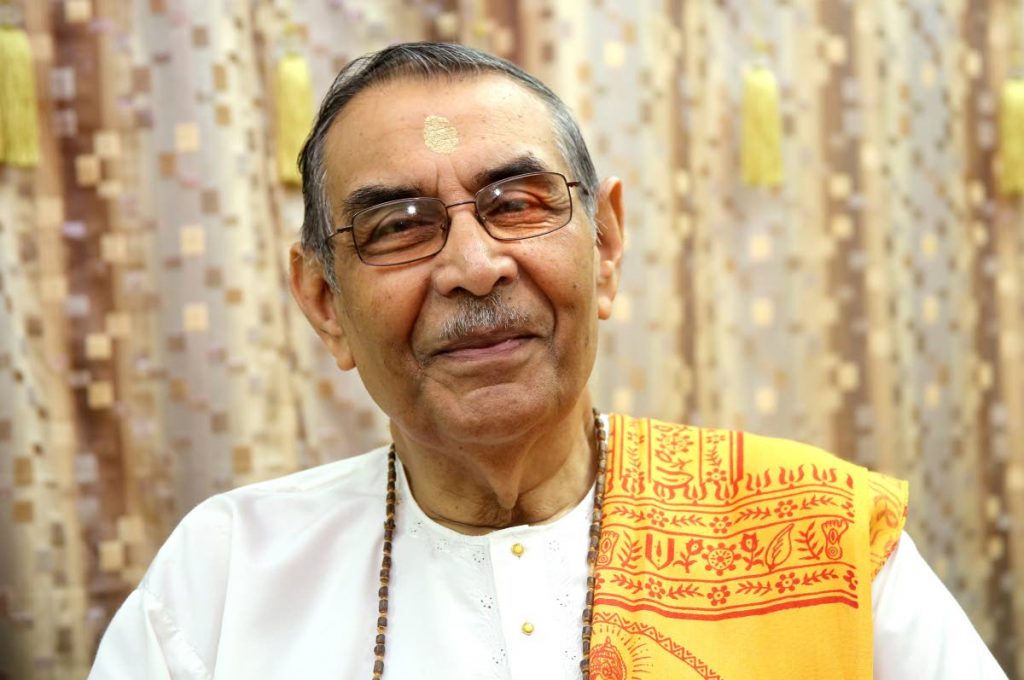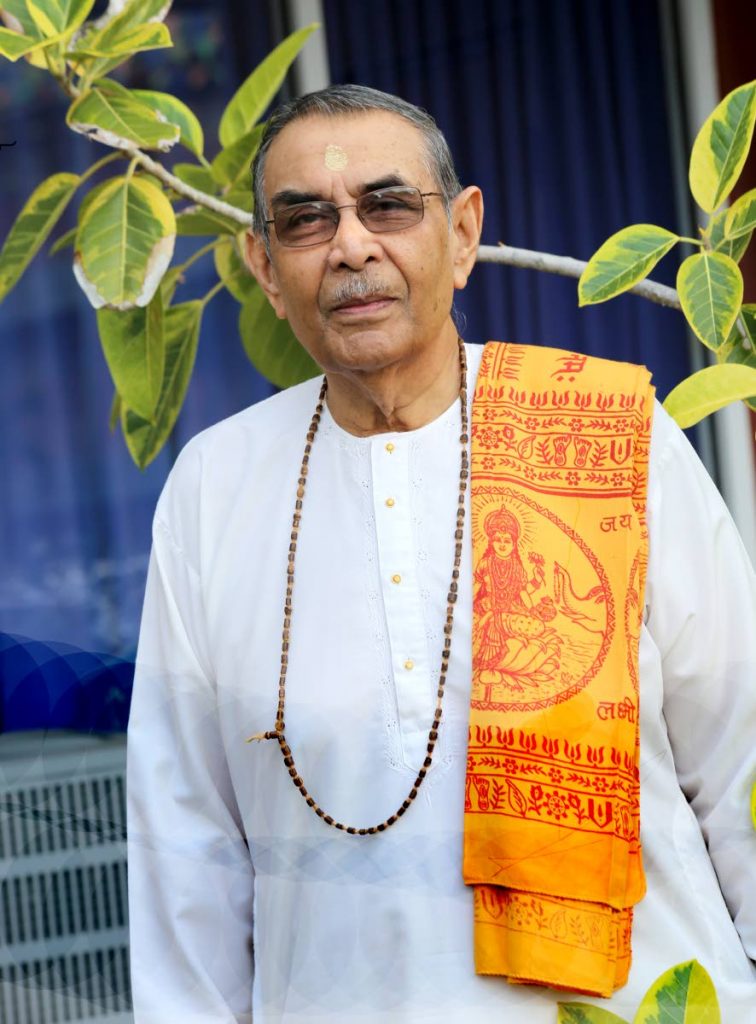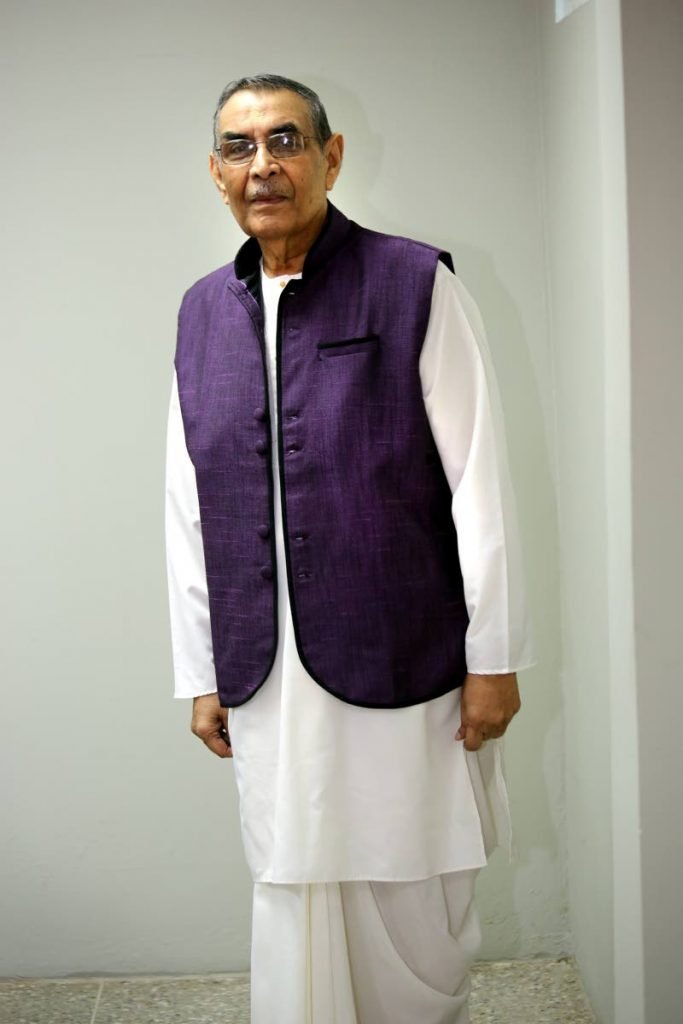Parasram, man of the people

Psychiatrist, politician, cricketer, pundit, chairman. Dr Rampersad Parasram has had many roles and positions over the years, all with the aim of developing the people of TT, and for the betterment of society, and by extension, the world.
Parasram, 75, was installed as spiritual leader and Dharmacharya of the Sanatan Dharma Maha Sabha (SDMS), on October 12, at the organisation’s headquarters at Lakshmi Girls’ Hindu College, St Augustine.
He is a former medical chief of staff at St Ann’s Hospital, principal medical officer and chief medical officer at the Ministry of Health, chairman of the North West Regional Health Authority, director at the Eastern Regional Health Authority, president of the Mental Health Association, vice president of the National Council for Alcoholism, chairman of the United National Congress, lecturer at Niherst and UWI, first chairman of the Divali Nagar, and the list goes on. He also received the Public Service Medal of Merit (gold) in 2010.
He said life was not lived in compartments, so he did not leave any one thing because of frustration with another. In fact, he enjoyed everything he has done, all of which, he said, had a human face to it. He cared about and loved people and felt the need to address their physical, mental, intellectual, and social needs. Without people, he said, he would be nothing.
“Someone raised the question, why I would do all these things and for me it is a constant search for self. I have seen all these things, I have always seen them as different facets for community and social development. I believe the role of government has to be the welfare of people. The aim of social work or cultural activism or religion, they all have a say in the development of people and communities so they all point towards a better society.... There is a Hindu saying, ‘People of small minds speak of what is mine and what is yours, but people of expanded consciousness understand that the world is one family.’”
Parasram said his appointment was not a surprise because he was aware that some people were considering him for the position after the death of the former leader, pundit Uttam Maharaj, last year. However, he was grateful that the SDMS had such confidence in him.
“I am not at the age where one gets excited and carried away because I was also acutely aware of the responsibility that the position carries. So it is not about occupying the position and having the title. For me, it was a question of whether I could faithfully and properly discharge the responsibility of a religious community.”
He said he was not in any hurry to establish objectives, set goals, or make changes. Instead, he has been informally meeting with people of all age groups to gain a better understanding and knowledge of his community and their needs.

He stressed that his responsibility was that of the spiritual or religious, not issues of policy or infrastructure as that was the responsibility of the organisation’s administrative arm, including the secretary general, secretary and executive.
However, he said he wanted to invest in the youth and add value to what already existed. He admitted that he did not have to “change the wheel” as the SDMS has been investing in youths for years. In fact, the organisation already had 42 primary and five high schools where children were exposed to aspects of religion and culture, and TV and radio stations to facilitate communication. He said people from the schools and communities had done well in all fields so he did not believe it would be difficult to get the them involved at other levels.
He praised SDMS general secretary Satnarayan Maharaj for his vision, concern for youths, and his passion. “I have respected him because he has fought battles for the community. Some people would not say what he says because they do not have the moral confidence to speak what he is talking about. I find that he is very refreshing and progressive. The truth is I don’t have to defend him, he defends himself. People must have the courage to speak their minds and I think he has that courage. I want to thank him for what he has fought for, for social justice.”
Parasram believed his passion for social justice grew out of the conversations and developments in India, including the Ghandian movement, during his time studying medicine in Kottayam, India. He later studied psychiatry in the UK and became a member of the Royal College of Psychiatrists there. He said he could have stayed there but he loved TT too much. He returned home and never had any regrets about his decision.
On his return, “one thing led to another” and he became the chairman for the Caucus for Love, Unity and Brotherhood 1988, which led to the chairmanship of the UNC.
However, he said he had always been an advocate for community mental health and so contributed to TT’s mental health plan which was adopted by Cabinet in 2000.
He said when speaking about the development of people, the mental health of individuals, families and communities must be addressed – it was about encouraging people to live well, think right, and enjoy good levels of happiness. Therefore, he resolved to pay attention to the holistic well-being of his community.

As Dharmacharya, his primary responsibility was to Hindus but Parasram said he had no intention of stopping there. “I will pay attention to the total well-being of the community I serve, and the nation at large, because we do not live in isolation. I don’t think I would ever be able to neglect the mental health of the people... I will work with my colleagues in quarters to find the best way of generally improving the health, including the mental health, of people in general.”
God at the centre of life
A pundit since 1958, Parasram said he grew up in a religious home. He said his father was a pundit for 72 years, and two of his brothers were also pundits. “God was always part of my life. I was taught very early by my parents to honour God. I am grateful because in my worst times, God has been my strength. I often say to my young friends to make God part of your life because when you have nothing else, you have God. I think we all have to believe in something.”
He said Hinduism was a “broad canvas” and it did not preach a certain dogma. Instead, it encourages people to create their own path to self realisation and salvation – many rivers lead to the ocean.
For example, he said Hinduism had six orthodox philosophies, and the holy books named three pathways – knowledge, passion, and devotion – and devotion alone had nine sub divisions.
“When you add to that the many traditions in Hinduism, for example the Vaishnava, and then there are those who worship Shiva, then you have those who worship the mother as the supreme deity, there are those who worship Ganesh, and there are others. And in Trinidad, we also have it. Hinduism is not monolithic. The SMDS is the largest group that follows the general path of righteousness, but there are other groups too. And the reason I am outlining this for you, it is a very broad canvas which allows for choice yet there is a confluence between the philosophies.”
He said Hinduism was based on truth and purity, cleanliness of the mind, the heart and one’s environment. He added that truth, purity, kindness, and charity were the four pillars of Hinduism, and it preached love, one world, and one family.
He said people should stay away from dogma and fanaticism because it would lead to condemnation and damnation. “I think one should never talk down to people. We should never be judgemental. We should give everyone respect because God is equally present everywhere and nobody’s perfect. We learn as we grow and I think understanding that, particularly with young people, when they do things different from the way you are doing them, it is not good to get upset about it. Listen to them and look at them and understand their point of view. Embrace them as far as possible. I would like to believe that I have never been condescending.”
According to Parasram, events like Divali help to break down barriers of race, religion, and culture. He said he looked forward to the way the country came alive during the festival – people dressing up, sharing gifts, the lighting of the deyas, and the cultural shows.
He admitted that people in different places, even different parts of India, celebrate various festivals in different ways, but he said he thoroughly enjoyed how TT celebrated Divali.
“I enjoy Divali. I am glad that it came from its humble beginnings to be the national festival it is today. I am very happy for that. By creating these kind of events you can begin to break down barriers and involve people. Divali was at one time a quiet celebration, now commercial banks are celebrating it, ministries and governments are celebrating it, (the other) night I was at the prime minister’s residence celebrating it. So I think there are lots of good things about the way we celebrate Divali.”
At the same time, he admitted that the “gatekeepers” must ensure the sanctity of the festival while not dampening the human spirit.


Comments
"Parasram, man of the people"